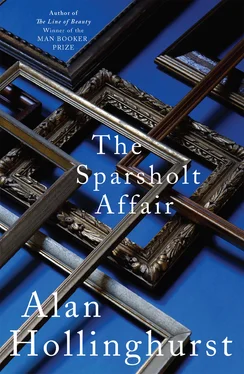Alan Hollinghurst - The Sparsholt Affair
Здесь есть возможность читать онлайн «Alan Hollinghurst - The Sparsholt Affair» весь текст электронной книги совершенно бесплатно (целиком полную версию без сокращений). В некоторых случаях можно слушать аудио, скачать через торрент в формате fb2 и присутствует краткое содержание. Год выпуска: 0101, Издательство: Pan Macmillan, Жанр: Старинная литература, на английском языке. Описание произведения, (предисловие) а так же отзывы посетителей доступны на портале библиотеки ЛибКат.
- Название:The Sparsholt Affair
- Автор:
- Издательство:Pan Macmillan
- Жанр:
- Год:0101
- ISBN:нет данных
- Рейтинг книги:5 / 5. Голосов: 1
-
Избранное:Добавить в избранное
- Отзывы:
-
Ваша оценка:
- 100
- 1
- 2
- 3
- 4
- 5
The Sparsholt Affair: краткое содержание, описание и аннотация
Предлагаем к чтению аннотацию, описание, краткое содержание или предисловие (зависит от того, что написал сам автор книги «The Sparsholt Affair»). Если вы не нашли необходимую информацию о книге — напишите в комментариях, мы постараемся отыскать её.
The Sparsholt Affair — читать онлайн бесплатно полную книгу (весь текст) целиком
Ниже представлен текст книги, разбитый по страницам. Система сохранения места последней прочитанной страницы, позволяет с удобством читать онлайн бесплатно книгу «The Sparsholt Affair», без необходимости каждый раз заново искать на чём Вы остановились. Поставьте закладку, и сможете в любой момент перейти на страницу, на которой закончили чтение.
Интервал:
Закладка:
Evert, Charlie Farmonger and I went over at five-thirty to collect our guest for dinner; we planned a drink in the bar first. He came in with a small cigar going, and Miss Holt again just behind.
‘There’s one thing I’d ask,’ he said, as he took his glass of gin. ‘Will you be introducing me later on?’
‘I will, sir, yes. I thought—’
‘Keep it brief, if you don’t mind.’
‘I won’t go on long,’ I promised.
‘I gave a talk in Paris last year – chap went on for a good twenty minutes, full of praise, of course, finest writer alive and all that, but it eats into one’s own time.’
‘I’ll have to praise you a bit,’ I said. But this was close to teasing, and Victor showed by his congested frown over his cigar that I wasn’t to try anything in that line. I’d wondered for a second if Victor was teasing himself, but of course he wasn’t mocking his French introducer – he was in strict agreement with him. It appeared Miss Holt agreed with him too, though with a hint of anxiety, as if telling herself to concentrate.
When we sat down at a small round table with our drinks I looked more closely at her. She was about thirty-five, slender but not frail, with hesitant brown eyes, and dark hair pulled back from a face more intelligent than beautiful. ‘Have you been with Mr Dax long?’ I asked. ‘Hardly any time,’ she said, with an uncertain smile. I said it must be fascinating. She thought for a moment before murmuring, rather sweetly, ‘I’m still learning the ropes.’ Her accent was refined, she seemed to say ‘the reps’, and I guessed she was an educated woman making ends meet. I couldn’t help seeing her in that moment as Lorna Monamy in The Heart’s Achievement or Christine Lant in Horseman, What Word? , those obscurely troubled helpmeets to the war-blinded artist and the disillusioned sage. Her delicate fingers trembled slightly, and I noticed when she reached for her glass the soft ridge where a long-worn ring had been removed.
Poor Evert wasn’t really with us. He’d produced his famous father and now sat beside him with an empty beer glass, as if hardly knowing who he was. We shared a few long glances, which made me feel uncomfortably not merely his friend but his accomplice. Victor carried on as if his son weren’t there, and after a while Evert seemed to feel the need to remind him that he was. A silence had fallen over all of us before he said pleasantly, ‘How’s Herta, Father?’
‘Why do you ask?’ said Victor, rather crossly; and Miss Holt too looked uncomfortable. ‘I don’t know if you’ve heard about the German Blitzkrieg presently being waged over the very roof of your family home’ – he looked quickly round at us to enlist us in his sarcasm. Charlie laughed loudly, and Evert said he had heard, that was why he was asking; he was as unsure as the rest of us what he had said wrong. A silence fell, and I changed the subject and nervously asked Victor about the name Dax – was it Dutch? I think I must have known it was his mother’s family who were Dutch. ‘No, it’s an old Shropshire name,’ Victor said, ‘as a matter of fact.’
‘I wonder then if it’s a Norman name,’ I said, ‘that has lost its apostrophe.’ I thought myself it was extraordinary how he elicited this kind of flattery and submission merely by sitting there and staring at us over his drink. He seemed to compute the relative problems and advantages of the Norman idea – he blew up a big cloud of smoke in busy, rather wounded-looking thought before he said, ‘You may well be right,’ superbly making no claim himself to such ancient lineage, and making it sound as if I cared far more about the matter than he did.
Jill came to join us just as we were leaving the hotel. Victor perked up a bit at the sight of another woman, and as our little group trailed back down Alfred Street towards the College, they walked together, in the noncommittal good humour of such brief moments between strangers. Jill held the torch, Miss Holt and I came just behind, with Evert and Charlie in the rear. The night was so clear, after the earlier drizzle, and the moon already so strong that the torch was barely needed. The roofs across the street gleamed steeply, and the reflected moon slid from window to dark window like a searchlight. By now I was measuring the length of dinner, which was all that remained before my speech, but I watched Jill too. Her confidence with Victor had a touching new note of bravery to it – she flattered him, which was what he demanded, and where from a man the flattery, once secured, was treated with disdain, from her he was prepared to take it. ‘I hugely enjoyed The Gift of Hermes ,’ I heard her say, and Victor said something about enjoyment being the least he hoped readers would get from it. ‘In my considered opinion,’ she said (and here I regretted that dear bossy tone of hers), ‘it’s the finest thing you’ve done.’
‘Well, it’s a great book,’ said Victor briskly, as if there were no point in either of them pretending otherwise. But he smiled as he turned to her. ‘Though not as good, I hope you’ll think, as the one I’m writing now.’ Like others of our writers he took no interest in his hosts, but with her there was a glint of engagement through the cigar-smoke. I suppose I was jealous.
We came in through the back gate of the College, the achievements of the Boat Club chalked up in the quad all glimmering in the moonlight. Though he was the guest of our Club, Victor dined with the Fellows on High Table: there was just a moment, when Evert left him at the SCR door, when I glimpsed the straightforward affection of father and son, a quick nod, a light pat of Evert’s upper arm as the great man turned away. In Hall he was seated next to the Dean, and I glimpsed him myself now and then between the backs of the nattering dons with a kind of proprietary affection, and a real anxiety, now the thing was unstoppably in motion, about how he would go down with the undergrads. Evert had stuck by me, counting on my understanding, and we wisely sat where we couldn’t see David. Even so, his presence somewhere behind us made the starving Evert turn his meal over incapably and gaze into the dark oak of the table as if it hid untold marvels, or miseries.
It was when we came down from Hall into the moonlit Tom Quad that we started to hear the noise. We were pulled up short as the crowd of undergraduates pressed behind us and around us. The sound was of a weight and penetration and strange gusted density we hadn’t heard before, outside London: the sickening irregular drone of the Heinkel 111. In a quick flick of the flashlight I saw Evert and his father, side by side, stock-still and staring up at the nearly invisible spectacle. Victor’s head was back, his mouth open, so that even he, with his famous indifference to the Blitz, appeared for a second like a figure witless with fear. On and on it went – no one could count, but there might have been fifty, a hundred, two hundred enemy aircraft, Heinkels and Dorniers, passing high overhead towards the north. I felt a hand grip my elbow and sensed more than saw that it was David. I did my best to stand steady, a little anchor for him, as he swung round on the flood of the crowd, and with his other hand seized on Evert. I had the impression we both held him up, as he stood gaping at the thing he had dreaded above all.
Sparsholt’s home was destroyed that night, though it was two days before he knew for sure what had happened. Hearing the siren, his parents had gone out as always to the air-raid shelter at the bottom of the garden; the noise of explosions was already loud when they found that the cat wasn’t with them. Frank Sparsholt ran back to the house for it, and died there together with the cat while his wife sat trembling underground thirty yards away, terrified by the noise and by what she had allowed to happen.
Читать дальшеИнтервал:
Закладка:
Похожие книги на «The Sparsholt Affair»
Представляем Вашему вниманию похожие книги на «The Sparsholt Affair» списком для выбора. Мы отобрали схожую по названию и смыслу литературу в надежде предоставить читателям больше вариантов отыскать новые, интересные, ещё непрочитанные произведения.
Обсуждение, отзывы о книге «The Sparsholt Affair» и просто собственные мнения читателей. Оставьте ваши комментарии, напишите, что Вы думаете о произведении, его смысле или главных героях. Укажите что конкретно понравилось, а что нет, и почему Вы так считаете.












